Graham Reid | | 7 min read
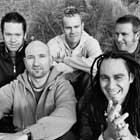
For two guys who have done 27 interviews back-to-back in Sydney, arrived in Auckland at midnight and got up early for a Mike Hosking interview on Breakfast, Tiki Taane and Andrew Penman are surprisingly chipper.
Taane is playing a Tony Hawk skateboard
game on a laptop, and Penman is looking through a scattering of CDs,
vinyl and posters on the coffee table of this suite in the upmarket
Stamford Plaza. There is fruit on the table, a stacked minibar and
the other comforts of such flash hotels.
If anyone deserves the full five-star pamper it is Salmonella Dub, the dub/dance Christchurch five-piece Taane and Penman are representing this day. They are the most popular live band in the country who also regularly step on stages to pick up awards for their albums, international achievements and especially their shows.
As Nu Steppa on their forthcoming album says: "Another sell-out show, tomorrow we gotta go, in another town, we bring a rockin' sound ... "
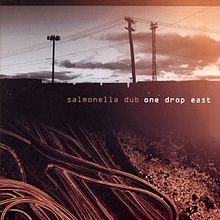 But if bands have a natural lifespan,
as Neil Finn says, then Salmonella Dub are a miracle of musical
science. It has been more than 10 years since they formed and now, with their fourth album One Drop East due,
it is timely to reflect on why they have survived when others
haven't.
But if bands have a natural lifespan,
as Neil Finn says, then Salmonella Dub are a miracle of musical
science. It has been more than 10 years since they formed and now, with their fourth album One Drop East due,
it is timely to reflect on why they have survived when others
haven't.
It hasn't been easy. Their ambitious Outdoor Styles tour in 2001 with King Kapisi and Pitch Black cost them $50,000 because the billing didn't bring in the numbers.
"I listened to others people's advice in setting that one up," says Penman. "It was the big summer tour we'd seen other acts do and were told the line-up would double the audience. Unfortunately it was the same audience. I got an inclination a month or two out I'd talked it up too well and we couldn't back out. We knew how much we were going to lose. That was a depressing time."
Penman was ready to quit but they got into the studio and pulled off the exceptional, multi-platinum seller Inside the Dub Plates. Even with those sales they face a huge tax bill. GST, says Penman, the band's manager/guitarist, is "a Nazi poor man's tax".
But they have had conspicuous successes along the way - ironically the multi-platinum Killervision album of '99 was the album they least liked - and have had releases in Europe, remixes by Very Famous People, and Inside the Dub Plates debuted at number one.
Yet they are not as big as we think they are. They still have day jobs: among them, drummer Dave Deakins manages a fish and tackle shop, and saxist/keyboard-player Conan Wilcox works in cafes and pizza places.
Off-site horn player and sixth member Pete Wood does music for television, Taane does production work, and Penman has taken leave from Hagley High and will decide in the next couple of months whether he will go back teaching.
They might be in the Stamford Plaza and have a high profile, but it doesn't translate into much hard currency.
Penman: "Because we're doing it ourselves and not picking up big advances which would allow us to carry on, we have to sustain it ourselves. We're trying to market ourselves internationally but in doing that we're spending profit made here on travel, which is not GST recoverable. In the last year we spent about $150,000 going overseas and that's a lot of money lost to GST.
"We're in a dilemma because we have a company set up in Australia now - but if we earn money there over a certain amount we get taxed, and what we bring home as a dividend is taxed again."
What keeps them going is not just the music and the successes, but a subtle internal dynamic. Having a manager in the band means he knows their needs, they control their own product, and they have stayed in the South Island.
Being away from Auckland is an advantage, says Penman. "It means we have no daily contact or interference from the industry and can disappear from the media so we have a mystique."
"And people are not sick of us," laughs Taane. "We're not always down at the club."
Penman now lives at Kaikoura, where they partly recorded One Drop East, and images of the area grace the album sleeve. Their music has a sense of the southern geography which has informed their attitude, says Penman.
"We're on the peninsula looking straight up the coast and the mountains drop straight into the sea. Over the summer there would be pods of dolphins and you only have to go out a kilometre and you've got whales. It's quite humbling, and only a couple of weeks ago we had snow down to sea level.
"The landscape keeps me there, and with that ruggedness comes a certain attitude, possibly from our pioneering ancestors as well. I've got the diary of my great-great-great grandmother who arrived on one of Wakefield's ships in 1842 at the age of 12 and spent a year with her brothers and father in a fern hut. They took turns fighting off the rats at night, and cleared scrub. So that staunchness is in us, the environment creates that."
Salmonella Dub also possess canny business sense. They don't bilk or betray their audience and have releases tailored to individual markets. From tomorrow, if local fans pre-order One Drop East from a record shop they get, until stocks last, a free EP of rare dub tracks or the remix album Outside the Dub Plates with an Australasian bonus disc.
In Australia One Drop East comes with a bonus DVD, and in Brazil they have released a compilation, Killer Dubplates. The "ticket" for a recent Christchurch show was a mini CD which featured a three-minute preview of an album track, Octopus. This is astute marketing, as is dropping off vinyl of Octopus to DJs a month before the CD reaches stores.
Licensing tracks to compilations has kept their international profile up, but they over-extended financially when they went to Europe and around Australia in 2000. Until recently they've dropped an average of $10,000 on Australian tours.
To appear on French television to an audience of two million doesn't translate into record sales if you have no network to take advantage of it. And having an album released in Brazil may not be a big deal. It's a market racked by piracy, and incomes are low.
"But we'll give it six months and see what numbers are sold," says Penman. "If it sells a few thousand we'll look at going over. In France and Belgium we sell up to 3000 or 4000 albums but it doesn't warrant going back. So we're being cautious about things because of this tax bill. "
Locally the Dub audience has reached a threshold restricted by the venue sizes on the touring circuit. Stepping up from the 1000-capacity hall to 2500 is risky and expensive.
There is venue and PA hire, advertising costs, and the problem of marrying the licensed venue with all-ages gigs. They also worry they can overplay venues like Auckland's St James.
What they don't worry about is their performance. They are more relaxed now, says Taane, who used to beat himself up after gigs he thought not the best. And the shows are still fresh for them.
Taane: "A lot of it has to do with the fact we're quite a jam-ey sort of band, so there are elements where each show or song is not going to be the same. We have samples but the drummer is not tied in. If he's feeling hyped he'll play it more energetic, and if he's cheeky he'll play slow to keep us alert. It's on the edge and pretty nerve-racking, especially if you're playing big rooms and flying by the seat of your pants."
They laugh about bad gigs: the Boiler Room at a Big Day Out before 15000 when the crew hadn't plugged in any mikes and Taane had to do it while singing, another at the Tuis when someone stood on a power-pack, breaking it so they couldn't trigger samples.
Penman cites the old jazz thing. If you make a mistake repeat it a few times and people think it was meant to happen.
"But you can't rest on your laurels and New Zealand is the worst place in the world for the tall poppy syndrome. That's why we've built it slowly rather any major fly-by-night success."
They admit their new album is a consolidation rather than a great leap forward. It sounds an extension of Outside the Dub Plates, and they started on it only three months after that album was finished.
Taane: "It feels comfortable and there's nothing too new in it, but what we're doing sounds a lot easier."
Other things are also getting easier. A change in the cultural climate of Australia has favoured them. It is no longer locked into Ocker rock and pop. There is now interest in roots music.
Penman: "Six years ago when we first went it was scary. Industry people said, 'Don't say you're from New Zealand and don't mention reggae'. We still got shouldered a bit by Virgin over there when we presented the Dancehall Girl single and they said, 'It's a bit reggae'. But Triple JJJ [radio network] jumped on it and it has been the highest rotate track we've ever had."
The video has been picked up by Australian MTV and they have reached the level where they can play any night of the week and sell out. That means touring is viable. "We've done five- or six-week tours and have only had one or two gigs a week. You have downtime, which costs an arm and a leg, and it's when relationships break down because people get bored."
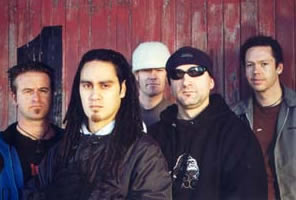 Their forthcoming Australian tour is an
economic 17 dates in 20 days and they are starting to make money,
"but it's taken 14 tours to get to that level", says
Penman.
Their forthcoming Australian tour is an
economic 17 dates in 20 days and they are starting to make money,
"but it's taken 14 tours to get to that level", says
Penman.
Their dancecard for next year is interesting already: Maybe Brazil, definitely the album released in Europe in February/March followed by a club tour, then back for the summer festival season to keep the momentum going. There is also preparatory work on a 2005 concert hall tour of the band with the NZSO, Royal New Zealand Ballet, Black Grace and a kapa haka group.
It's a brave concept by Brendan Meek, former manager of the ballet. It means an orchestra in the pit, the ballet on stage and maybe Salmonella Dub being floated in from the wings - like Spinal Tap?
But you don't knock it. Touring with those illustrious folk might mean enjoying the comforts of these flash hotels again.

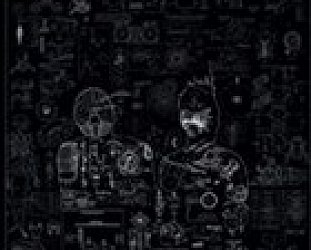

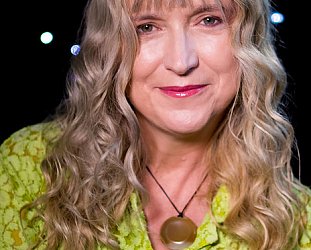

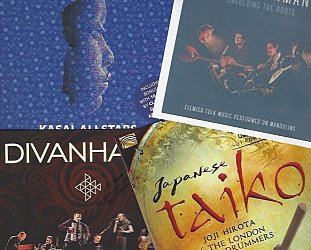

post a comment